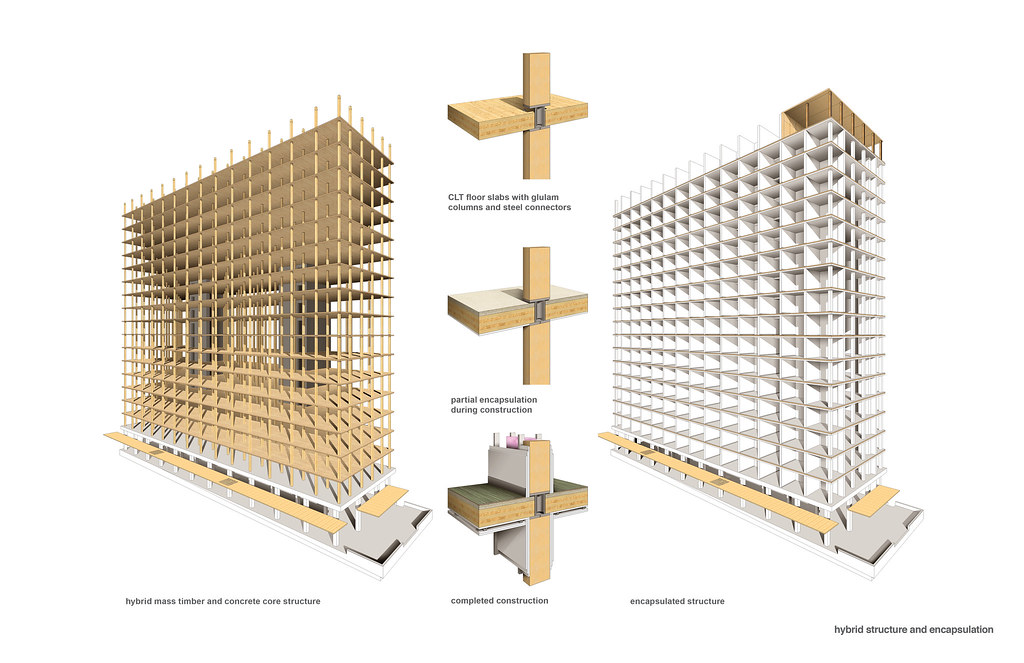The 2018 Code Conforming Wood Design (CCWD), a joint publication of the American Wood Council (AWC) and the International Code Council, is now available.
The free download summarizes key provisions related to the use of wood and wood products as they appear in the 2018 International Building Code (IBC). The publication compiles the occupancy and height and area provisions of the IBC for wood structures into one publication.
“The complexity and scope of the IBC makes it difficult for designers to know about all of the code provisions that affect the use of wood products in construction,” said Kenneth Bland, AWC vice president of codes & regulations, in a news release. “CCWD consolidates and provides additional explanation for many of those provisions to make wood building compliance with the IBC as simple as possible.”
Among the 2018 IBC code changes mentioned in the 2018 CCWD:
· Alternatives for protecting attics in buildings using an NFPA 13R automatic sprinkler system. This has specific application to construction designed in accordance with IBC Sections 510.2 and 510.4, based on the height of the roof above the lowest level of required fire department vehicle access.
· Provisions for a fire-watch during non-working hours when construction exceeds 40 feet in height above the lowest adjacent grade, if required by the fire code official. The International Fire Code contains additional fire watch provisions.
· Updated references to AWC’s 2018 National Design Specification for Wood Construction and 2018 Wood Frame Construction Manual.
Related Stories
| Apr 19, 2012
Michigan legislature tackling controversial rules on electricians
A fight is brewing in the Michigan legislature over how many fully qualified electricians must be present during electrical work when apprentices also are on hand.
| Apr 19, 2012
Washington city may base building code on rising sea level due to global warming
Aberdeen may become the first city in Washington to base a building code on rising oceans and global warming.
| Apr 19, 2012
CSI webinar on energy codes and building envelopes
This seminar will review recent changes in energy codes, examples of building enclosure wall assemblies for code compliance, potential moisture management and durability challenges, and design tools to assess and minimize potential problems.
| Apr 19, 2012
Innovative plan for storm water in Philadelphia gets EPA’s OK
Philadelphia's $2 billion plan to manage its storm water with green methods including porous pavement, green roofs, and more trees, was officially approved last week by the U.S. Environmental Protection Agency.
| Apr 19, 2012
LEED 2012 to include new credit category for transit-oriented development
The updated LEED 2012 system will introduce a new credit category, “Location and Transportation,” to encourage development oriented around public transit and more walkable communities.
| Apr 17, 2012
FMI report examines federal construction trends
Given the rapid transformations occurring in the federal construction sector, FMI examines the key forces accelerating these changes, as well as their effect on the industry.
| Apr 16, 2012
University of Michigan study seeks to create efficient building design
The result, the researchers say, could be technologies capable of cutting the carbon footprint created by the huge power demands buildings place on the nation’s electrical grid.
| Apr 13, 2012
Congress’s action doesn’t mean Pentagon can’t build LEED gold structures
Though Congress passed a defense budget preventing the Department of Defense from spending money to achieve LEED gold or platinum certification, the Pentagon may still end up constructing buildings to those standards.
| Apr 13, 2012
International Living Building Institute certifies first two Net Zero Energy buildings
A community building in Oregon and an office building in California are the first two projects to earn net-zero status under the International Living Building Institute’s Net Zero Energy Certification program.
















